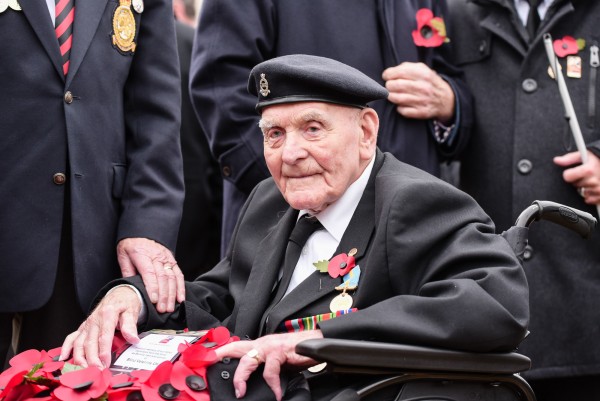Ron Freer, 103 and from Cliftonville, will be marching at the Cenotaph as part of the national Remembrance Sunday commemorations with more than 100 other blind veterans supported by Blind Veterans UK, the national charity for vision-impaired ex-Service men and women. It has been confirmed by the Royal British Legion that Ron will be the oldest veteran to march at the Cenotaph on Remembrance Sunday.
This year the commemorations are particularly significant as the nation marks the centenary of the end of the First World War.
Ron says: “I am hugely honoured to march at Cenotaph on behalf of Blind Veterans UK. It is an extraordinary charity, which makes an unbelievable difference to the lives of veterans like me, and our families too.
“Being the centenary of the end of the First World War, this year holds special significance for me as my own father was killed on 4 September 1918 and is buried at Dernancourt Communal Cemetary in the Somme, France.”
This year, Ron returned with his family to Dernancourt Communal Cemetary to visit his father’s grave and lay a wreath.
Ron joined the Army in 1931 and, on the outbreak of the Second World War, was posted to Hong Kong to defend the then British colony. In late 1941, the Japanese attacked Hong Kong including Fort Stanley, where Ron was based. After 18 days of fighting, his garrison surrendered against overwhelming odds.
He became a Japanese prisoner of war (POW) and remained so until the end of the Second World War. It was this four year ordeal that led to Ron losing his sight because of the malnutrition he suffered in the camp.
Ron says: “The camp was situated on the edge of the harbour with high fences all around. The Japanese brought in a bag of rice for each unit but only enough for one meal a day per man. We cut an oil drum in half and used the bottom as a boiling pot for the rice.
“Each man was given a scoop of rice but many were unable to eat it and looking at the portion of rice, one could see mice droppings and insects. Disease soon broke out resulting in many deaths.”
In 1943 the group of POWs were transported on a ship called The Lisbon to Japan. It was on this journey that diphtheria broke out amongst the two thousand men aboard. Ron caught the infectious disease and his life was only saved by the actions of two doctors.
He says: “Lying in the hut with all the others suffering, I heard a voice say ‘turn over Sergeant’, I was then injected with something and the voice said, ‘you are very lucky’. I knew then that it was our medical officer. He later told me that a Japanese civilian doctor had managed to smuggle in six phials of anti-diphtheria toxin so the two of them had saved my life.”
A month later, Ron had completely lost his sight and most of his hearing and spent the remainder of the war in the camp medical hut. At the end of the war he returned to the UK via the Philippines and New Zealand. It was then that his journey with Blind Veterans UK, then known as St Dunstan’s, began.
Ron has been supported by the charity since 1946 and has gone on to live a full, happy, independent life.
He says: “I returned to the UK after being a POW for nearly four years. Having lost my sight as well as my hearing my future seemed very dismal and I didn’t want to think about what lay ahead. This was until I began to receive support from Blind Veterans UK.
“I was given my confidence back bit by bit through training such as learning braille. My main objective, as man in my early thirties, was to find employment. After I married, I had the opportunity of opening a new post office and my wife and I continued to operate it for 25 years. This was all thanks to Blind Veterans UK, who helped me to purchase the property.
“It will be an honour to march with them once again.”
Blind Veterans UK was founded more than 100 years ago to support those blinded in the First World War. Now, the charity supports veterans regardless of when they served or how they lost their sight.
In October Blind Veterans UK unveiled a bronze statue of seven blinded First World War soldiers outside Manchester Piccadilly station. It is the only permanent memorial in the UK marking the 100th anniversary of the Armistice.
Chief Executive of Blind Veterans UK, Major General (Rtd) Nick Caplin CB says: “Remembrance Sunday is a very poignant time for our blind veterans as we reflect on the sacrifice and service of all members of the Armed Forces.”
“Blind Veterans UK was founded in 1915 in response to the more than 3,000 veterans who were blinded as a result of the First World War. Today we support more blind veterans than ever before in our history, but we know there are many more who still need our help to rebuild their lives following their sight loss.”
Visit blindveterans.org.uk/victory to learn more about the charity and how you can support its vital work today.
Notes to Editor:
Blind Veterans UK helps vision-impaired ex-Service men and women of every generation rebuild their lives after sight loss. Since 1915 we’ve provided rehabilitation, training, practical advice and emotional support to tens of thousands of blind veterans.
Find out more at: blindveterans.org.uk and follow us on Facebook at: facebook.com/blindveteransuk and on Twitter at: twitter.com/blindveterans.
For all media enquiries please contact:
Mark Wheeler, PR Manager at mark.wheeler@blindveterans.org.uk.


















